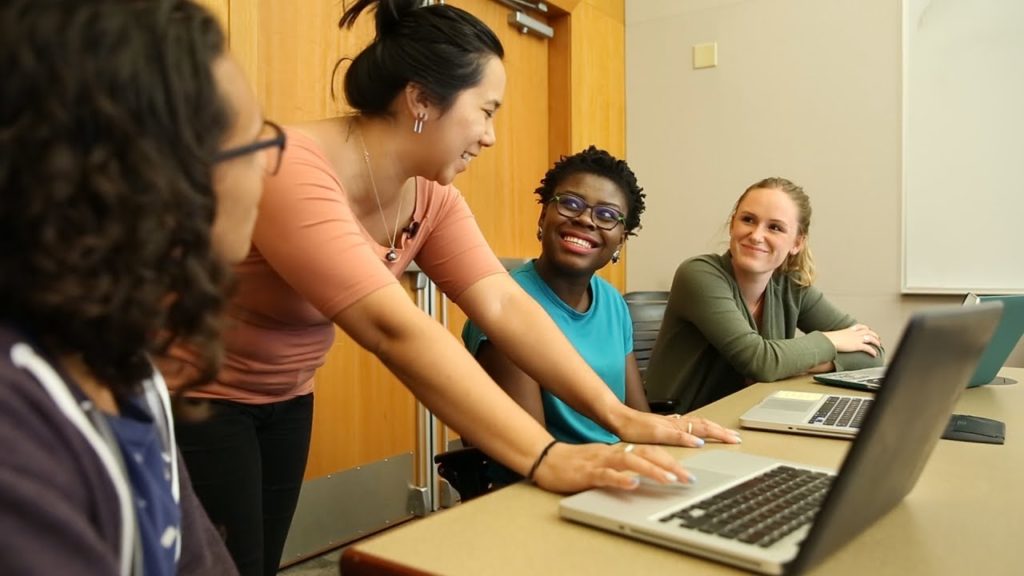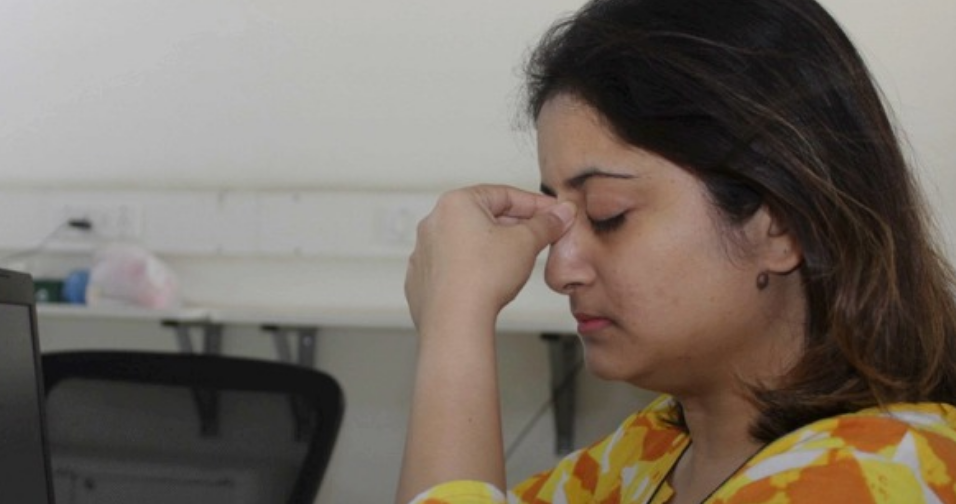Author: Alexandra Elliott – Header image: Troll Patrol India, Amnesty Decoders
Witnessing is widely accepted as an established element of enforcing justice, and recent increase in accessibility to big data revolutionizes this process. Data witnessing, now, can be conducted by remote actors using digital tools to code large amounts of information – a process exemplified for instance by Amnesty International’s Amnesty Decoders. Gray presents an account of the Amnesty Decoders initiative and provides examples of their cases, such as “Decode Darfur” (977) in which volunteers successfully identified the destruction of villages during war by comparing the before and after satellite imagery. A critical, yet under-discussed consequence of this type of work is the significant mental toll of engaging with this amount of confronting material. The nature of human rights exposés means witnesses are working with disturbing imagery often depicting violence and devastation, which can lead to secondary trauma and must be managed accordingly.
This blog-post should be read as an overview of completed research into the mental health effects of data witnessing and the initiatives that should be put in place to mitigate this. It concludes by highlighting Berkley’s Investigations Lab as an example of the efficient implementation of protective measures in human rights research. The text below presents, however, only the tip of the iceberg of detailed scholarship and I recommend turning to the Human Rights Resilience Project for a more thorough inventory.
The Human Rights Resilience Project is an “interdisciplinary research initiative […] working to document, awareness-raising, and the development of culturally-sensitive training programs to promote well-being and resilience among human rights workers” (“Human Rights Resilience Project – NYU School Of Law – CHRGJ”). Whilst not undertaking any human rights witnessing itself, it functions as a toolbox for those who do. It provides an excellent example of bringing the issue to the forefront of discourse, advocating for the psychological risks of engaging in human rights witnessing to receive the attention it’s severity demands so that both workers and institutions can prepare and manage accordingly.
Data Witnessing and Mental Health
We have reached a point in research in which the correlation between declining mental health and exposure to confronting material in data witnessing work is undeniable. There is a large collection of papers available which evidence the harmful impact on mental wellbeing within the human rights industry.
Dubberly, Griffin and Mert Bal’s research provides a clear overview of “the impact that viewing traumatic eyewitness media has upon the mental health of staff working for news, human rights and humanitarian organisations” (4). They introduce the notion of a “digital frontline” (5) as online data witnessing relocates the confrontation of graphic, disturbing material previously encountered exclusively in the physical field to an office desk far removed from the scene of the crime. 55% of the humanitarian workers and data witnesses observed in the research viewed shocking profanity at least weekly. Carried along with this shift is the psychological impact affiliated with engaging with disturbing content. The effects detected included that workers “developed a negative view of the world, feel isolated, experience flashbacks, nightmares and stress-related medical conditions” (5).
Over the past few years, a range of similar research was undertaken, of which I have presented merely a selection, all confirming a correlation between human rights witnessing and a negative headspace. In Knuckey, Satterthwaite, and Brown list human rights work practices that would contribute to fluctuating mental states, being; trauma exposure, a sensation of hopelessness, high standards and self-criticism, and inflexibility towards coping mechanisms. Similarly, Reiter and Koenig also discuss impacts of humanitarian research on workers’ mental health. Flores Morales et al. conducted a study of human rights defenders and journalists in Mexico of whom are consistently exposed to traumatic content in their work. They detect strong levels of secondary traumatic stress symptoms amongst 36.4% of participants. Finally in one of the earlier investigations into the concern, Joscelyne et al. surveyed international human rights workers to determine the consequences their work had on their psychological wellbeing. The results stated participant levels of 19.4% for PTSD and 18.8% for subthreshold PTSD. Depression was present amongst 14.75 of workers surveyed. Shockingly, these proportions are very similar to those observed amongst combat veterans reiterating the severity of the matter and emphasising the requirement for action.
A Call to Action
Several sectors of the literature on the relationship between data witnessing and mental health focus on what initiatives are currently adopted by organisations to identify, prevent and counteract occasions of trauma and depression amongst researchers or proposes new, potentially effective strategies.
Satterthwaite et al. is an example study that aims to map established techniques for recognizing and reacting to mental health concerns within human rights work. Ultimately it is concluded that the current action of organisations is weak and the suggestion is for targeted training programmes and further academic discourse. Observations of negligence seem to become a trend, with Dubberly et al. also reporting a lack of protective processes in place amongst the majority of organisations studied. In what is dubbed a “tough up or get out” culture (7), humanitarian efforts deny proper recognition of the effects of trauma upon their researchers and thus offer no support or compensation. Additionally, new employees are not notified of the degree of profanity of their daily work material and are consequentially inappropriately prepared.
Acknowledging this gap in current support structures, academics have sought to develop strategies detecting, preventing and reducing declining mental health amongst data witnesses. For instance, Reiter and Koenig’s “Challenges and Strategies for Researching Trauma” describe protective techniques that aim to strengthen resilience; eg. explicitly acknowledgement of the psychological consequences and subsequently fostering a supportive workplace community.
Academics too urge the need for tools for self-care. Distinct from the pampering sessions and beauty treatments commonly affiliated with the term, here self-care practices are put to use to strengthen mental health. Pyles (2018) promotes self-care within the work of data witnessing for its ability to “cultivate the conditions that might allow them to feel more connected to themselves, their clients, colleagues and communities” (xix). This sense of community and grounding within a greater environment is important to counteract any feelings of isolation. Kanter and Sherman also encourage human rights organisations to adopt a “culture of self-care” to mitigate the risk of mental burnout and Pigni’s book “The Idealist’s Survival Kit” was written to provide human rights researchers and witnesses with an artillery of 75 self-care techniques.
As mentioned by Satterthwaite et al., tt is important to acknowledge the lack of mitigating practices in place may well be because of a lack of funding rather than an act of negligence. Dependency on external fundraisers introduces a complex network in which responsibility is distributed amongst a range of actors with varying motivations.

Leading by Example
The tendency for human right organisations to neglect their workers’ mental wellbeing is fortunately not universal. There are instances of hiring counselors and enforcing regular breaks and rotations (Duuberly et al.), one standout initiative is that of the University of Berkley’s Human Rights Centre Investigations Lab.
Following a similar format to the Amnesty Decoders, workers at the Investigations Lab “use social media and other publicly available, internet-based sources to develop evidence for advocacy and legal accountability” (“HRC Investigations Lab | Human Rights Center”). What sets the Lab apart is its dedication to “resiliency resources” – a programme of training and tools aiming to support the witnesses’ wellbeing. Upon orientation to the lab, workers receive resiliency training in which they receive small practical tips to avoid secondary trauma; “use post-its to block out graphic material when viewing a video repeatedly” (“Resiliency Resources | Human Rights Center”), for example. Additionally they are encouraged to regularly check in with an allocated resiliency manager.
Concluding Thoughts
The material human rights witnesses engage with is horrific and the protection of their mental health must be prioritized by the institutions for which they work. However it is also important to remember the necessity of their work in detecting human rights violations and war crimes. The role of data witnessing is admirable and cannot simply be omitted. Therefore the way forward is for human rights institutions to guarantee a support network of education, tools and community so that witnesses can continue to strengthen humanitarian action without personal detrimental consequences.
About the author
Alexandra grew up in Sydney, Australia before moving to England to complete her Bachelors degree at Warwick University. She is currently undertaking a Research Masters in Media Studies at the University of Amsterdam. It is through this course that she became involved with the Good Data tutorial and DATACTIVE project.
References
Dubberley, Sam, Elizabeth Griffin, and Haluk Mert Bal. “Making secondary trauma a primary issue: A study of eyewitness media and vicarious trauma on the digital frontline.” Eyewitness Media Hub (2015).
Flores Morales, Rogelio et al. “Estrés Traumático Secundario (ETS) En Periodistas Mexicanos Y Defensores De Derechos Humanos”. Summa Psicológica, vol 13, no. 1, 2016, pp. 101-111. Summa Psicologica UST, doi:10.18774/448x.2016.13.290.
Gray, Jonathan. “Data Witnessing: Attending To Injustice With Data In Amnesty International’S Decoders Project”. Information, Communication & Society, vol 22, no. 7, 2019, pp. 971-991. Informa UK Limited, doi:10.1080/1369118x.2019.1573915.
“HRC Investigations Lab | Human Rights Center”. Humanrights.Berkeley.Edu, https://humanrights.berkeley.edu/students/hrc-investigations-lab.
“Human Rights Resilience Project – NYU School Of Law – CHRGJ”. Chrgj.Org, https://chrgj.org/focus-areas/human-rights-resilience-project/.
Joscelyne, Amy et al. “Mental Health Functioning In The Human Rights Field: Findings From An International Internet-Based Survey”. PLOS ONE, vol 10, no. 12, 2015, p. e0145188. Public Library Of Science (Plos), doi:10.1371/journal.pone.0145188.
Kanter, Beth, and Aliza Sherman. “Updating The Nonprofit Work Ethic”. Stanford Social Innovation Review, 2016, https://ssir.org/articles/entry/updating_the_nonprofit_work_ethic?utm_source=Enews&utm_medium=Email&utm_campaign=SSIR_Now&utm_content=Title
Knuckey, Sarah, Margaret Satterthwaite, and Adam Brown. “Trauma, depression, and burnout in the human rights field: Identifying barriers and pathways to resilient advocacy.” HRLR Online 2 (2018): 267.
Pigni, Alessandra. The Idealist’s Survival Kit: 75 Simple Ways to Avoid Burnout. Parallax Press, 2016.
Pyles, Loretta. Healing justice: Holistic self-care for change makers. Oxford University Press, 2018.
Reiter, Keramet, and Alexa Koenig. “Reiter And Koenig On Researching Trauma”. Www.Palgrave.Com, 2017, https://www.palgrave.com/gp/blogs/social-sciences/reiter-and-koenig-on-researching-trauma.
“Resiliency Resources | Human Rights Center”. Humanrights.Berkeley.Edu, https://humanrights.berkeley.edu/programs-projects/tech-human-rights-program/investigations-lab/resiliency-resources.
Satterthwaite, Margaret, et al. “From a Culture of Unwellness to Sustainable Advocacy: Organizational Responses to Mental Health Risks in the Human Rights Field.” S. Cal. Rev. L. & Soc. Just. 28 (2019): 443.
Image References
Berkeley. “Human Rights Investigations Lab: Where Facts Matter”. Human Rights Centre, https://humanrights.berkeley.edu/programs-projects/tech/investigations-lab.
Perpetual Media Group. “14 Things Marketers Should Never Do On Twitter”. Perpetual Media Group, https://www.perpetualmediagroup.ca/14-things-marketers-should-never-do-on-twitter/.
